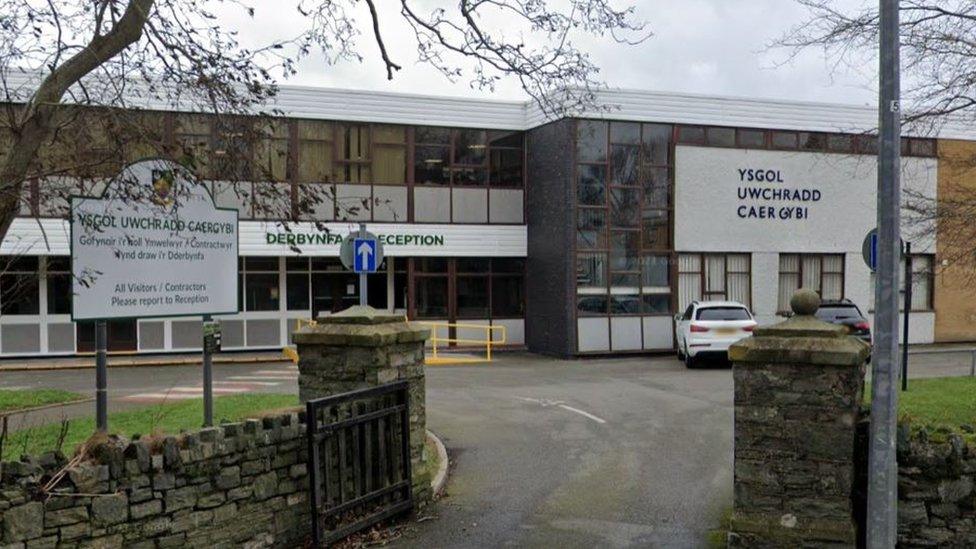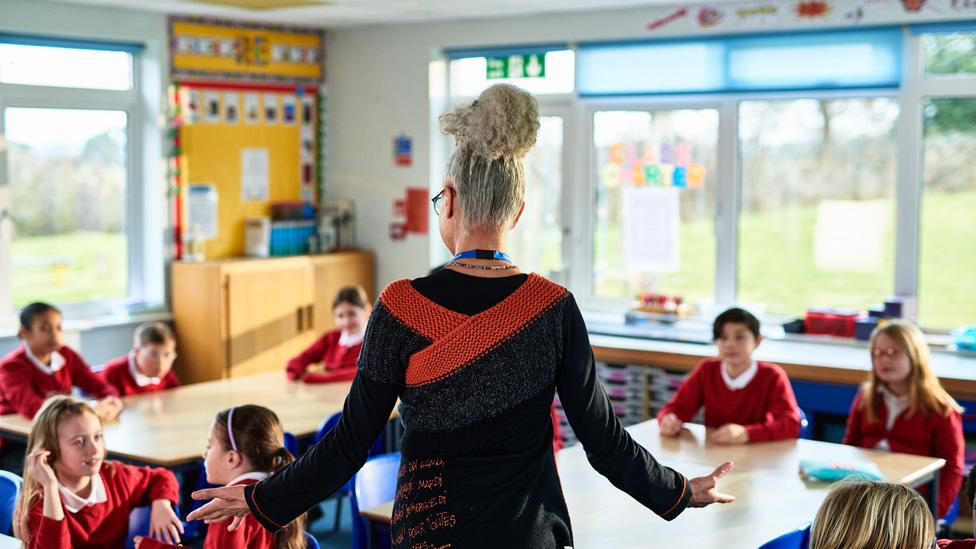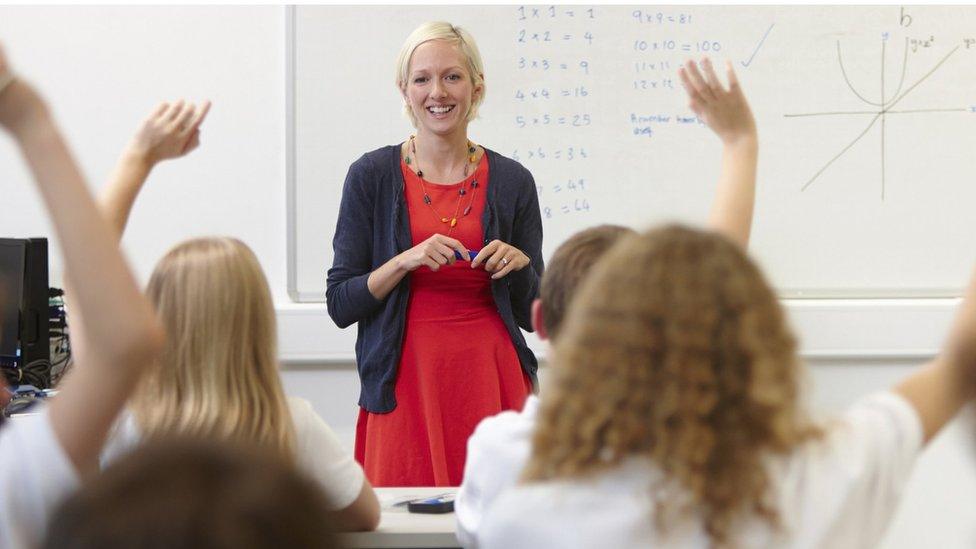Raac: Maths studied on kitchen hobs in concrete crisis school
- Published

Pupils at Ysgol Uwchradd Caergybi have been struggling to learn because of crumbling concrete
Crumbling concrete in schools has left pupils learning maths on kitchen hobs, they have said.
Between Covid and Raac, some children at Ysgol Uwchradd Caergybi on Anglesey have never sat formal exams.
Head teacher Adam Williams said teaching at the school was more difficult now than during the pandemic.
About 60% of it was shut in September because of reinforced autoclaved aerated concrete (Raac), a type of concrete at risk of collapsing.
Effie, 14, was pleased to return to face-to-face learning last week, but there were still problems - she was being taught RE in the technology block.
It had been frustrating, she said, adding: "I didn't have some of my GCSE subjects that I picked face-to-face until this week. It's been so disruptive and really stressful."

Effie said there was a big difference between face-to-face and online learning
Cloe, 15, said: "My year, and Effie, we were the Covid kids, so the transition between year six and seven was just - not it.
"We couldn't adapt, so we were very lost," she said. "The teachers are trying to keep us together really, keep us on the right track."
Cloe said her classmates felt their potential was "being limited".
"In reality we're just constantly behind," she added.
Rhys, 17, was an upper sixth former and studying maths, physics and product design who decided to drop back to Year 12, because of the disruption.
He said: "I've had priority to come in every day. However, I haven't been in the school, I've been down the local library, which has caused more bad than good."
Teachers, he said, did not have full access to equipment there and "weren't really able to give efficient lessons... We were missing out".

Cloe Evans said she and her classmates are expected to adapt but feel they are being limited by the issues
He said he was worried about his grades, due to limited online resources.
Indiana, 15, said: "At one point I was doing maths on a hob in catering. It's not ideal."
When school started after the 2023 summer holiday, Indiana said she spent every Tuesday and Thursday at home, adding that teachers had been hampered by the difficulties of online lessons.
"It's slowed things down a lot," she said. "I know in a few classes we're quite behind."
Mr Williams said the hall had been used for online learning and maths had been taught in kitchens, with most pupils getting a mix of online and face-to-face learning.

Indiana said teachers had been hampered by the difficulties of online teaching
Up to 40% of the building is still closed for work, but all pupils are now back at school.
Raac was used between the 1950s and 1990s as it was cheaper than standard concrete.
Last summer, after a buildings review in England, the Health and Safety Executive (HSE) warned Raac beyond its 30-year lifespan might collapse.
Five schools in Wales were identified as containing Raac, compared with 231 in England and 39 in Scotland.
Ysgol Uwchradd Caergybi was the only school in Wales to be partially shut for an extended period after closing in September.
The school lost 44 classrooms, 18 offices and eight toilets and staff had just two days to find a solution for more than 800 children.
Mr Williams praised his "fantastic" staff, saying: "This period has been probably more difficult than the period that we endured through Covid."
Since September the school has juggled different learning methods.
Vulnerable pupils, those facing exams and those with additional needs were prioritised for face-to-face teaching.
However, space had to be found in a school where more than half the rooms were closed.
Sixth formers have attended face-to-face lessons most days, but in Holyhead Library.
Pupils returned last week but much of the building remains closed and some classrooms that are open have exposed wires and building noise can be heard throughout the building.
Mr Williams said he was talking with exam board WJEC, external to see what could be done to take into account any impact on children's learning and grades.
"I hope there'll be an appreciation of the challenges we've faced," he said.

Sixth former Rhys said he dropped back to Year 12 because of the disruption
Mr Williams said it was a relief to welcome pupils back, but the school still had restricted areas and there were still parts "we can't use".
It is not known how long the remaining work will take, or who will pick up the bill.
Anglesey council's learning service manager, Aaron Evans, hopes the Welsh government will help with the cost.
"I'm sure senior officers in Welsh government are doing as much as they can to help on that," he said.
The Welsh government said: "Discussions are ongoing with all local authorities affected to establish both the short-term and long-term costs associated with the remediation of Raac."
The WJEC said it continued to work with the school and steps had been taken to minimise the impact of the disruption, which included extending the submission deadlines for student coursework.

Are you affected by the issues raised in this story? Share your experiences by emailing haveyoursay@bbc.co.uk, external.
Please include a contact number if you are willing to speak to a BBC journalist. You can also get in touch in the following ways:
WhatsApp: +44 7756 165803
Tweet: @BBC_HaveYourSay, external
Please read our terms & conditions and privacy policy
If you are reading this page and can't see the form you will need to visit the mobile version of the BBC website to submit your question or comment or you can email us at HaveYourSay@bbc.co.uk, external. Please include your name, age and location with any submission.

THE AUBERGINE CAFE: Kizzy visits Wales' first neurodivergent-led sanctuary
MYFANWY HAYCOCK: Jenni is on a mission to revive the legacy

Related topics
- Published19 September 2023

- Published7 September 2023

- Published31 August 2023
